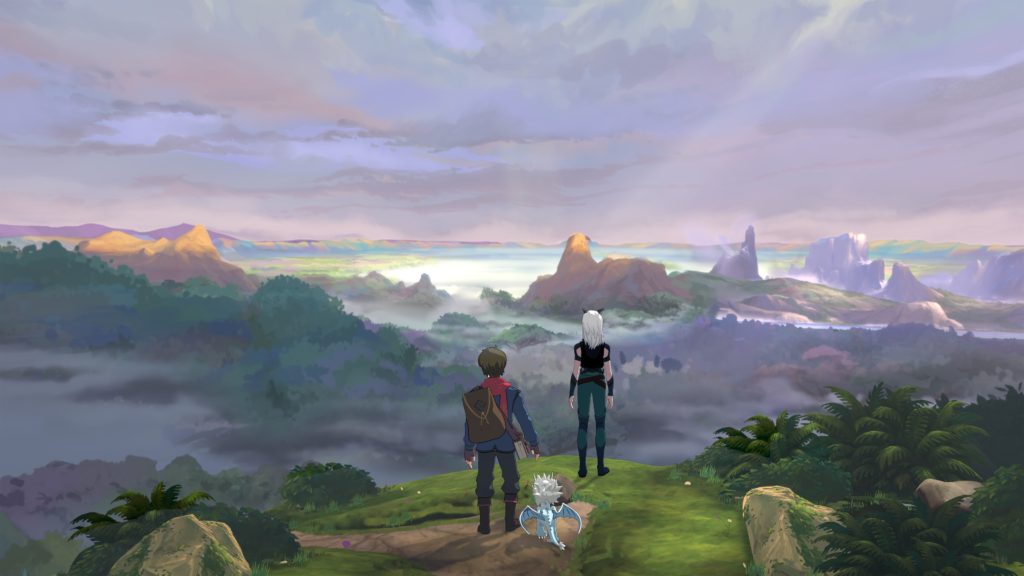Fantasy films and series are nothing without their sweeping scores, and The Dragon Prince is no exception. That’s thanks to the work of the Annie Award-nominated composer Frederik Wiedmann, whose work you may know from Batman: Hush or Green Lantern: The Animated Series. He’s been scoring the Netflix series since the beginning, and this year, The Dot and Line chatted with him about his inspirations, writing character themes, and more.
What was some of the music that inspired you when coming up with the original soundtrack for The Dragon Prince?
We did something a little unusual in TV animation. I started writing music very early on, even before a single frame of Episode 1 was animated. So what created the initial spark for inspiration for this was really the conversations I had with the filmmakers, the character designs that they showed me, as well as concept art. Based on those three elements, I pretty much spend a few months just coming up with character themes and the foundation of the orchestration texture. So the inspiration for me came more from the core of the show, as opposed to any other existing music.
How has the score evolved season by season? Is this season’s significantly different?
My feeling is that we did a good job leaving room to “go places” during Seasons 1 and 2. Yes, the music is big and epic at times, but it still left a lot of room to grow so that Season 3 can feel even more dramatic and epic in comparison. So many story lines have been leading up to this season, the music has been guiding them throughout previous episodes, and now everything has to “pay off,” musically speaking.
Does each character have a theme or setting? Which was your favorite to write and why?
Not each of them, but I’d say most of them do. The core thematic material was designed in early stages of the show, then others followed as we got to know them in the show. I think my favorite theme is Avaros’s theme. It’s such a unique piece that had to go though quite the transformation as the story progresses. In the beginning, mostly associated with just the Mirror, the theme has a mysterious quality to it—not necessarily foreboding. Only later on, when we know more about him, does the theme dramatically take a darker tone, but with the same musical backbone that I established.
Is it markedly different to write scores for animation than it is writing scores for live action? Why?
In animation, it appears that temp scores (music cut into the show from previous scores to give the composer a direction) are very rarely used. On top of that, often I work with unfinished animation, sometimes even in simple black and white, and the only audio I hear is unprocessed automated dialogue replacement. So what I am getting at is that scoring animation often requires a lot more imagination. You really have to picture what this scene is going to look, sound, and feel like when it is completed in order to score the dramatically correct music to it. In live action, you have a very good idea, since all elements are kind of there—sometimes also unfinished, but certainly a closer representation than in animation.
A lot of music for fantasy shows tends to incorporate similar instruments, modes, etc. How did you ensure yours stood out from the pack?
To create the world in which the story takes place, my main focus was to find unique solo instruments, worldly instruments, that would help create an ancient feel, as well as an otherworldly mood. Some of the most used “special” instruments I am using is Armenian duduk, Japanese shakuhachi, Celtic fiddle, Bolivian wind instruments, and medieval lutes. Those, combined with our rather grand orchestral score, hopefully give this music a nice unique touch.
You’ve also written scores for superhero series, horror movies, war movies. Do you have a favorite genre to write in? Do you prefer films or television? Why?
I love all genres, to be honest. I don’t really consider myself an “animation guy” or “superhero guy.” I love to think of myself merely as a filmmaker. I tell stories with my music, and the story is what matters. Animated or live action, it doesn’t matter. I honestly have no preference. If I get to contribute to a great story, I am happy.
Thanks for reading The Dot and Line, where we talk about animation of all kinds. Don’t forget to follow us on Twitter and sign up for our newsletter.
